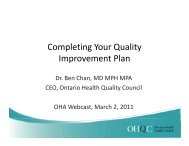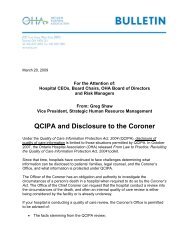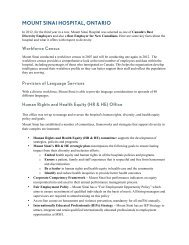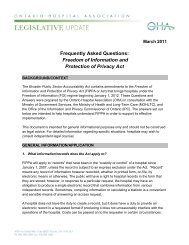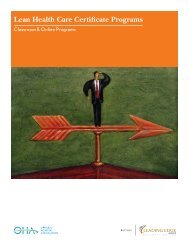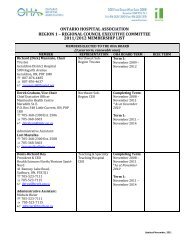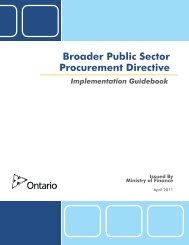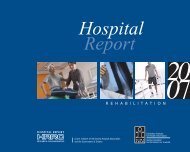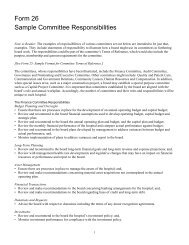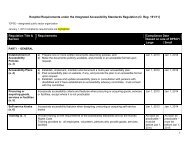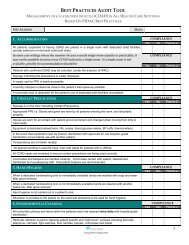Roles and Responsibilities of Physicians Supervising PAs - Ontario ...
Roles and Responsibilities of Physicians Supervising PAs - Ontario ...
Roles and Responsibilities of Physicians Supervising PAs - Ontario ...
- No tags were found...
Create successful ePaper yourself
Turn your PDF publications into a flip-book with our unique Google optimized e-Paper software.
Although the RHPA prohibits performance <strong>of</strong> controlled acts by those not specifically authorized toperform them, it does not apply if the person performing the act is doing so to render first aid ortemporary assistance in an emergency. 2 For example, if a passer-by sees someone in cardiacarrest in an airport <strong>and</strong> uses an automatic external defibrillator to assist him or her, there is nobreach <strong>of</strong> the RHPA. Although applying a form <strong>of</strong> energy prescribed in the regulations is acontrolled act under the RHPA, when it is done in an emergency it is not prohibited.Principles <strong>of</strong> DelegationThe vision <strong>of</strong> the College is to ensure the best quality care for the people <strong>of</strong> <strong>Ontario</strong> by the doctors<strong>of</strong> <strong>Ontario</strong>. In order to most effectively meet patient needs, health care is <strong>of</strong>ten delivered bymultidisciplinary teams. When controlled acts are delegated in appropriate circumstances, thisprocess can result in more timely delivery <strong>of</strong> quality health care, <strong>and</strong> can make optimal use <strong>of</strong>health-care resources <strong>and</strong> personnel. In every instance <strong>of</strong> delegation, the primary considerationshould be the best interests <strong>of</strong> the patient. Responsibility for the delegation <strong>of</strong> the controlled actalways remains with the delegating physician.Delegation may take place in one <strong>of</strong> two ways:1. Direct OrdersThe direct order provides instructions from an individual physician to another health care provider ora group <strong>of</strong> health care providers. The order relates to only one patient <strong>and</strong> initiates a specificintervention or treatment to be delivered at a specific time. It may be verbal 3 (over the telephone orin person) or written. 4 A direct order always takes place after a physician-patient relationship hasbeen established. 52. Medical DirectivesMedical directives are blanket instructions by physicians (<strong>of</strong>ten more than one) to other health careproviders. They pertain to any patient who meets the criteria set out in the medical directive. Themedical directive contains the delegation <strong>and</strong> provides the authority to carry out the treatments,interventions or procedures that are specified in the directive, providing that certain conditions <strong>and</strong>circumstances exist. 6 In most cases, medical directives are used to ensure that health care can bedelivered without a physician’s direct assessment <strong>of</strong> the patient or direct supervision. Their use isespecially frequent in institutional settings. 7A medical directive must always be written <strong>and</strong> must comply with the principles set out in thispolicy. Guidelines about the use <strong>and</strong> development <strong>of</strong> medical directives are found in Appendix 1 tothis policy. A prototype <strong>of</strong> a medical directive can be found at Appendix 2.A more comprehensive guide <strong>and</strong> toolkit is posted on the Federation <strong>of</strong> Health Regulatory College<strong>of</strong> <strong>Ontario</strong>’s (FHRCO) website at http://www.medicaldirectives-delegation.com. This guide wasdeveloped by a working group <strong>of</strong> FHRCO in 2006.The toolkit provides templates for construction <strong>of</strong> Medical Directives, as well as explanations <strong>of</strong> howto establish the prerequisites. The templates will have the most direct application for largeinstitutional settings, but anyone who wishes to establish a Directive (or to learn more aboutdelegation) will find them helpful. Their use is not m<strong>and</strong>atory, but any physician who delegates acontrolled act pursuant to a Medical Directive developed using these templates will be incompliance with the legislation <strong>and</strong> College policy <strong>and</strong> will be providing the very best quality <strong>of</strong> careto patients.Guidelines for DelegationUpdated July 2011 16



